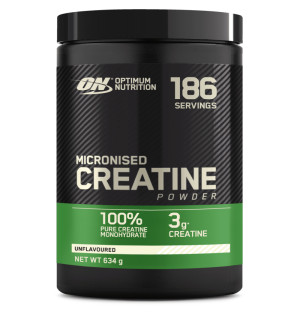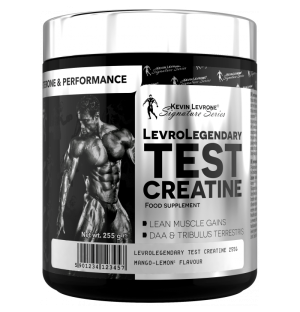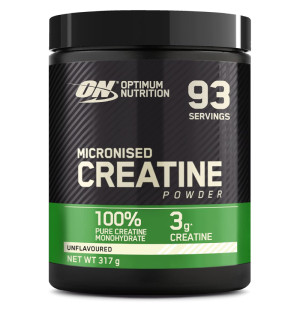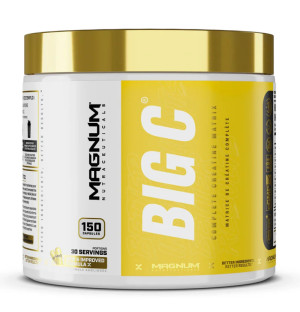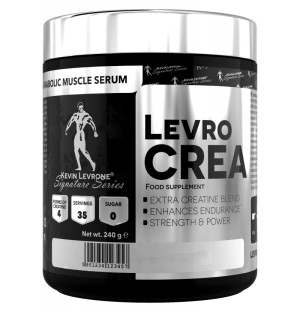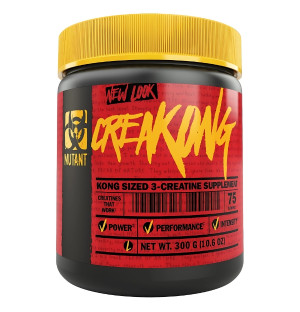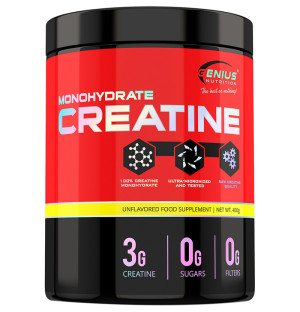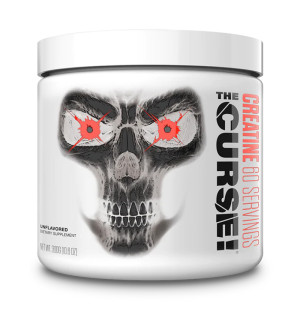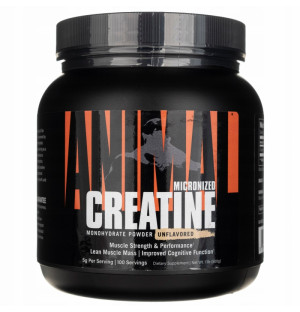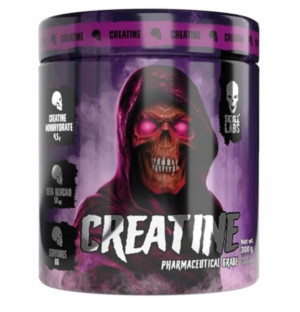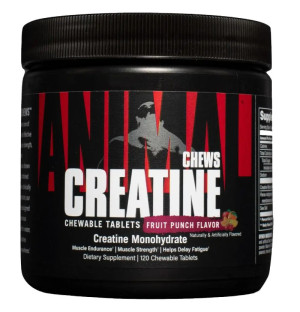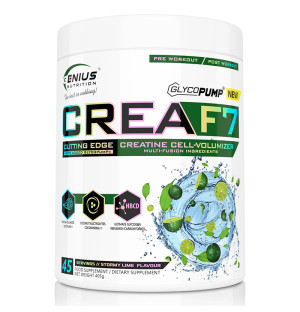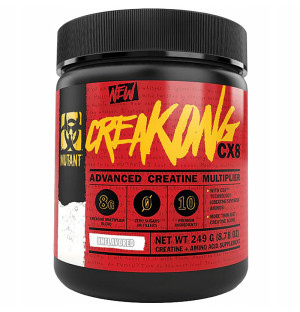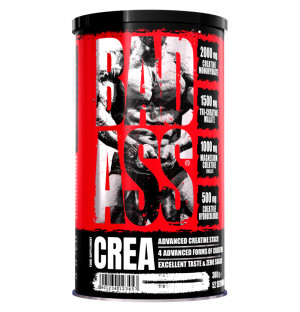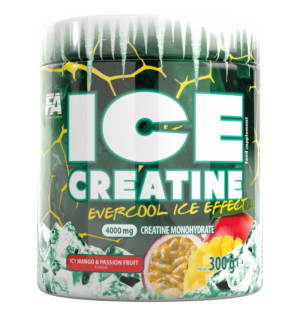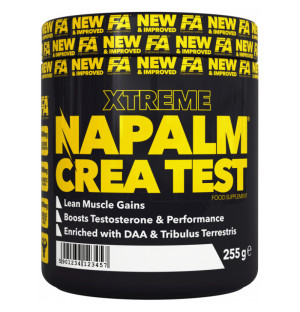Creatine
Creatine is one of the most popular and well-researched dietary supplements for athletes, with scientifically proven effects. This naturally occurring compound in the body is an indispensable support for those engaged in strength, endurance, and physique training. Thanks to its properties that enhance physical performance during intense exercise, creatine has gained recognition among both beginners and experienced athletes. Its wide spectrum of action allows for improvement in sports performance in a relatively short time, making it a fundamental element of supplementation for physically active people.
What is Creatine?
Creatine, more precisely β-methylguanidinopropionic acid, is a chemical compound naturally produced in our body, mainly in the kidneys, liver, and pancreas, with the involvement of three amino acids: methionine, glycine, and arginine. Most of the creatine produced is transported via the bloodstream to the skeletal muscles, where it plays a key role in energy processes, while a small amount is excreted in the urine.
This compound also occurs naturally in food, particularly in beef and fish. However, the amount of creatine provided by the diet and synthesized by the body is relatively small – supplying 5 g of creatine (the standard daily supplementation dose) would require the consumption of about 1 kg of meat. Therefore, those who train, especially intensively, often opt for supplementation.
Creatine gained particular popularity in the 1990s, when research on its direct impact on improving sports performance became widespread. Today, thanks to its proven effectiveness and safety, it is one of the most commonly chosen supplements worldwide.
The Mechanism of Creatine Action
Creatine primarily works by enhancing the process of ATP (adenosine triphosphate) resynthesis – the main energy carrier in the body. In muscle tissue, creatine is converted into phosphocreatine, which provides high-energy phosphate groups – a key energy source during short, intense bouts of exercise.
Scientific studies confirm that regular consumption of as little as 3 g of creatine per day increases physical performance during a series of short, very intense exercises. This mechanism makes creatine particularly effective in sports that require explosive power and short-duration high-intensity effort.
Types of Creatine
There are many forms of creatine available on the market, differing in both chemical structure and properties. Here are the most popular ones:
Creatine Monohydrate
The most popular, well-researched, and frequently used form of creatine. It is a combination of a creatine molecule with a water molecule. It is characterized by:
- Excellent absorption
- Effective tissue saturation in muscles
- Good water binding in muscles (the "pumped" muscle effect)
- The best quality-to-price ratio
Creatine Malate (TCM)
A combination of three creatine molecules with malic acid. It is distinguished by:
- Less subcutaneous water retention compared to monohydrate
- Better solubility in water
- Potentially better tolerance for individuals sensitive to monohydrate
- A lower risk of stomach problems
Other Forms of Creatine
- Creatine Citrate – a combination with citric acid, characterized by excellent solubility
- Creatine Ethyl Ester – produced through esterification, which prevents creatine from converting into the biologically inactive creatinine
- Kre-Alkalyn – buffered creatine monohydrate, designed to address the problem of low biochemical stability
- Creatine Pyruvate – similar to malate, characterized by less water retention
- Magnesium Creatine Chelate – an advanced form that allows for an increase in the amount of creatine in muscles without accumulating excessive water
There are also so-called creatine stacks available on the market, which are combinations of several forms of creatine, often enriched with additional ingredients such as vitamins, minerals, or amino acids (e.g., L-arginine, L-citrulline), designed to enhance synergistic effects and amplify training results.
Effects and Benefits of Creatine Supplementation
Creatine offers a range of scientifically documented benefits that make it an exceptionally valuable supplement for physically active people:
- Increase in muscle strength and power – allows for heavier workouts and lifting greater weights
- Improved performance during intense exercise – especially in short, intense bursts of effort
- Support for anabolic processes – assists in muscle mass building
- Acceleration of recovery between workouts – faster return to full performance
- Increase in muscle volume – due to water retention in muscle cells
- Support for cognitive functions – recent studies indicate a potential beneficial effect on brain cognitive functions
The effects of creatine supplementation are most visible during short, high-intensity physical efforts, such as sprints or weightlifting. It is worth noting that the results of creatine usage may vary among individuals, depending on their genetic predispositions and training styles.
Who is Creatine Intended For?
Creatine is particularly recommended for:
- Athletes in strength and strength-endurance disciplines – bodybuilders, powerlifters, strongmen
- Athletes in sports requiring short bursts of explosive power – sprinters, track cyclists, combat sport athletes
- Team sport athletes – football players, basketball players, volleyball players
- Individuals practicing street workout and calisthenics – training with body weight
- Beginners – those looking to accelerate early training effects
- Athletes during muscle mass building phases – aiming to increase muscle volume
Creatine may be less useful for:
- Individuals in a phase of intensive fat reduction focusing on muscle definition
- Athletes during a detraining period
- Competitors in ultra-endurance sports (although there are studies indicating benefits even in this group)
Safety and Side Effects
Creatine is regarded as one of the safest dietary supplements, with its safety confirmed in numerous scientific studies. When used appropriately according to the manufacturer's recommendations, creatine should not cause serious side effects.
However, it should be remembered that, like any supplement taken in high amounts, it may be associated with some undesirable effects. The most commonly reported side effects include:
- Water retention in the body – which may lead to rapid weight gain (mainly water), potentially affecting kidney function. Therefore, proper hydration is essential during creatine supplementation.
- Loss of valuable vitamins and minerals – due to increased urine excretion, which may lead to muscle cramps.
- Digestive problems – bloating, stomach pains, especially in individuals with sensitive stomachs or those suffering from acid reflux.
- Potential liver strain – when taking excessively high doses over a long period.
- Risk of muscle injury – muscle strain or overuse due to intensified training.
To minimize the risk of side effects:
- Follow the manufacturer’s dosing recommendations
- Drink plenty of water during creatine supplementation
- Choose high-quality products from reputable manufacturers
- Consider starting with smaller doses to test your body's tolerance
- Consult a doctor before starting supplementation, especially if you have any health issues, particularly related to the kidneys or liver
How to Use Creatine?
There are several approaches to creatine supplementation:
Loading Phase Method
- Loading Phase: 20-30 g per day (depending on body weight), divided into 4-5 servings for 5-7 days
- Maintenance Phase: 3-5 g per day for the following weeks/months
No Loading Phase Method
A constant dose of 3-5 g of creatine per day over a longer period (several weeks/months).
Cyclic Supplementation
Some athletes use creatine in cycles, for example, 8-12 weeks of supplementation followed by a 2-4 week break.
When to Take Creatine?
Discussions about the optimal timing for taking creatine have been ongoing for years. The most popular approaches are:
- Before training – to increase the availability of energy during exercise
- After training – to support recovery and replenish energy stores
- With the first meal of the day – for better absorption
- On non-training days – at any time, preferably with a meal containing carbohydrates
Scientific studies suggest that creatine is better absorbed in the presence of carbohydrates (e.g., dextrose) and ingredients such as magnesium or taurine. Consistency in taking it is more important than the specific time of day.
Frequently Asked Questions (FAQ)
Does Creatine Cause Weight Gain?
Creatine can cause an increase in body weight, mainly through water retention in the muscles. However, this is not an increase in fat tissue, but rather an increase in muscle cell volume. This effect is often desired by athletes aiming to increase muscle mass and strength.
Can Creatine be Combined with Other Supplements?
Yes, creatine can be combined with many other supplements. Particularly beneficial combinations include:
- Creatine + carbohydrates (which facilitate transport to the muscles)
- Creatine + magnesium and vitamin B6 (which support the nervous system and reduce fatigue)
- Creatine + taurine (which helps transport creatine into muscle cells)
- Creatine + alpha-lipoic acid (which may increase creatine levels in muscles)
What Happens if I Stop Taking Creatine?
After discontinuing supplementation, the level of creatine in the muscles gradually returns to its baseline, usually within 2-4 weeks. This may result in:
- A loss of some of the retained water (reduction in muscle volume)
- A slight decrease in strength and physical performance
- A return to the natural energy levels during training
There is no “rebound” effect or other negative consequences. Supplementation can be safely resumed at any time.
Is Creatine Legal in Sports?
Yes, creatine is legal and permitted by all major sporting organizations, including the World Anti-Doping Agency (WADA). It is widely used by top-level athletes in all sports disciplines.
How Long Can Creatine Be Taken?
Studies indicate that creatine is safe for long-term use. Many athletes take it continuously for years without any negative health consequences. However, some experts recommend cyclic supplementation with periodic breaks to prevent the body from “getting used” to an external source of creatine.
Why Should You Buy Creatine at GymHub.pro?
At GymHub.pro, we offer only the highest quality creatine supplements from reputable manufacturers who guarantee:
- The purity and quality of the raw materials used in production
- Strict quality tests at every stage of production
- No contaminants or banned substances
- Optimal absorption and effectiveness
Our team of experts carefully selects the products available in our assortment, guided by the latest scientific research and user opinions. This ensures that every creatine supplement purchased at GymHub.pro will be an effective support for your training.
Additionally, we provide:
- Expert advice in choosing the appropriate form of creatine
- Competitive prices and attractive promotions
- Fast shipping and professional customer service
- A guarantee of authenticity for all products
Legal Disclaimer
The information contained on this page is for educational purposes only and does not constitute medical advice. The information presented about creatine and its effects is based on currently available scientific research, although individual supplementation results may vary.
Dietary supplements, including creatine, should not be used as a substitute for a varied diet. A balanced diet and healthy lifestyle are important for maintaining proper health.
Before beginning creatine supplementation, especially for individuals with existing conditions or those taking medications, we recommend consulting a doctor or sports nutritionist.
GymHub.pro is not responsible for improper use of supplements that does not comply with the manufacturer’s recommendations.

